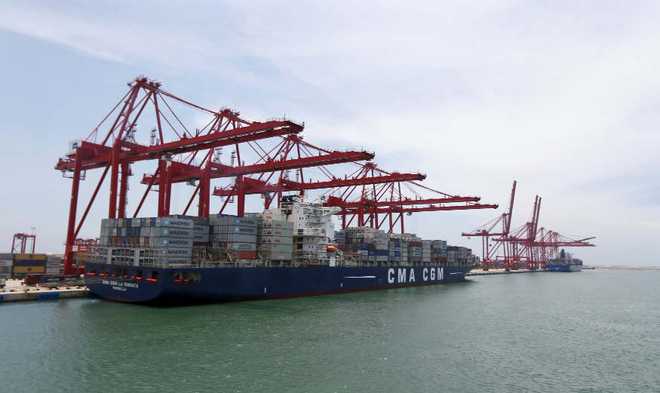
China sphere of influence in the region is rising. A container ship docked at the Colombo South Harbour funded by China. REUTERS.
Lt Gen Bhopinder Singh (retd)
The recent ruling of the international tribunal in Hague called off the Chinese bluff of claiming historical legality over the bulk of the South China Sea waters. The aggressive “nine-dash-line” approach of the Chinese swallows over 90 per cent of the disputed waters, much to the consternation of the wary neighbourhood. Behind the obvious issues of sovereignty, lies the geostrategic future and protection of the $5-trillion trade and the very survival of the Chinese juggernaut. This survival insecurity has led to the Chinese instincts of belligerence and strategic sweep like the “String of Pearls” that encompasses active “pitching” to various countries in the vicinity. Geographically, Sri Lanka is a priceless nugget in the Chinese chessboard of strategic footprints.
In 1952, the Dudley Senanayake government in Ceylon (now, Sri Lanka) faced a dual challenge of acute shortages of the staple rice and the limited availability of foreign exchange to source the same, from the international markets — to compound the economic miseries, international commodity prices of rubber had sunk to a record low, impacting Ceylon's rubber exports and forex realisations. A masterstroke in the form of a barter-based trade agreement with China, to import the much-needed rice in exchange of rubber for the Chinese, ushered in a critical understanding and relationship of the Chinese with the Island.
This act of dire necessity set the backdrop of modern Sri Lankan practicality when it came to dealing with the Chinese, thereafter. The subsequent hue and cry over the annexation of Tibet and the plight of fellow-Buddhist Tibetans was met with a stoic silence by Colombo —contrary to the language of Chapter II of the Sri Lankan constitution which mandates, “The Republic of Sri Lanka shall give to Buddhism the foremost place and accordingly it shall be the duty of the state to protect and foster the Buddha Sasana…”. The Chinese paid back the Sri Lankan for their silence and acquiescence, with weaponry during the difficult days of the Tamil wars when neither India nor the US was forthcoming to help the Sri Lankans — the Chinese had readily stepped in unconditionally to bail out the Sri Lankans, this time militarily.
However, it was the reign of the megalomaniac former President, Mahinda Rajapaksa that the pronounced pro-China tilt took shape and swerved dangerously to the utter discomfort of both India and the US. This tilt manifested in murmurs of the Hambantota port emerging as another “Pearl” port (like Gwadar in Pakistan, Marao Atoll in Maldives, Sittwe in Myanmar etc.) of the grand Chinese strategy to dominate the waters from the restive South China Seas, the vulnerable “chicken-neck” of Malacca Straits and all the way up to the African hinterlands. The alarm bells went ringing when Rajapaksa allowed Chinese submarines to dock twice in Sri Lanka, without informing New Delhi as per a long-standing agreement between the two nations.This Chinese transgression in India’s backyard was against of the spirit of the 1987 India-Sri Lanka accord, that binds both India and Sri Lanka to not to allow forces inimical to each other, to use the other nation's ports. However, it was the “cheque-book diplomacy” of generous doles and infrastructural investment by way of the mega $1.4 billion land-reclamation project of the Colombo Port City (part of Beijing's One Belt, One Road and New Silk Route initiatives) that could potentially entrap Sri Lanka into a veritable vassal status due to its financial indebtedness to the Chinese. Clearly, Rajapaksa's fondness for the Chinese was not just economic but also strategic, political and military. The end of the bloody Tamil conflict and the victory of the Sri Lankan forces had a lot to do with the critical supplies of Chinese ammunition and ordnance, besides the timely supply of six F-7 jet fighters, scores of anti-aircraft guns and a JY-11 radar system.
The providential electoral results spoilt the Chinese stratagem of the “String-of- Pearls” approach with decidedly pro-India governments emerging in Myanmar (Aung San Suu Kyi's NLD replaced the junta rule), Bangladesh (with Sheikh Hasina's Awami League in power) and in Sri Lanka, Rajapaksa was ousted by his own former minister Maithripala Sirisena who promised more neutrality to correct the Chinese tilt — “would not offer preferential economic or security access to any one country”, besides placing several Chinese contracts on hold for audit and review of the terms. Sirisena's election manifesto alluded to the impending Chinese noose by noting, “The land that the White Man took over by means of military strength is now being obtained by foreigners by paying ransom to a handful of persons. This robbery is taking place before everybody in broad daylight… If this trend continues for another six years our country would become a colony and we would become slaves”.
However, a year and half down the tenure of President Sirisena, the Chinese freeze is slowly thawing as financial considerations are forcing a climb-down from the earlier bravado, skepticism and intransigence against the Chinese. A precarious balance-of-payment situation, falling foreign reserves and a crippling $8-billion debt to China has brought Sri Lanka scurrying back to the Chinese to renegotiate the repayment terms and accept the reciprocal collateral conditions. Talk of equity swap instead of hard currency projects to mitigate repayment term has already been bandied.
The famed Chinese economic-statecraft via the “cheque-book” diplomacy has ensured the return of the Colombo Port City project, besides other initiatives like the expansion of the Hambantota port and Mattala airport. Certain new projects like the development of the Special Economic Zone is also on the burgeoning agenda. The Sri Lankan experience with the ostensible Chinese generosity and largesse has always been smooth and readily available (unlike the Tamil issues and conditions of India and the tight purse strings of Western powers). Also, the Chinese are “non-judgmental” and do not allow issues like alleged human right violations during the Tamil wars to derail stitching-up of strategic relationships.
Even though the Sri Lankans are making meek assurances that the Chinese return to favour does not entail any ownership of land as part of the Colombo Port Project, the Sri Lankan backtracking has geopolitical ramifications. India realises the reality of the Sri Lankan financial conditions and the resultant practicality of snuggling back to Beijing to avoid defaulting on debts. The Indians will do well to continuously forewarn and reiterate the typical strings that come attached with Chinese doles, partake all possible opportunities to ensure a toehold in all development projects (as it is supposedly not exclusive to any one nation) and indulge in smarter diplomacy to “sell” the benefits of the larger picture of an alternative, “anti-Sino” bloc which could be composed of countries like India, Japan, US and the other ASEAN powers.
For now the Chinese have gleefully re-entered the Sri Lankan waters by waving thick wads of hard currency.
The writer is a former Lt Governor of Andaman & Nicobar Islands & Puducherry.



























